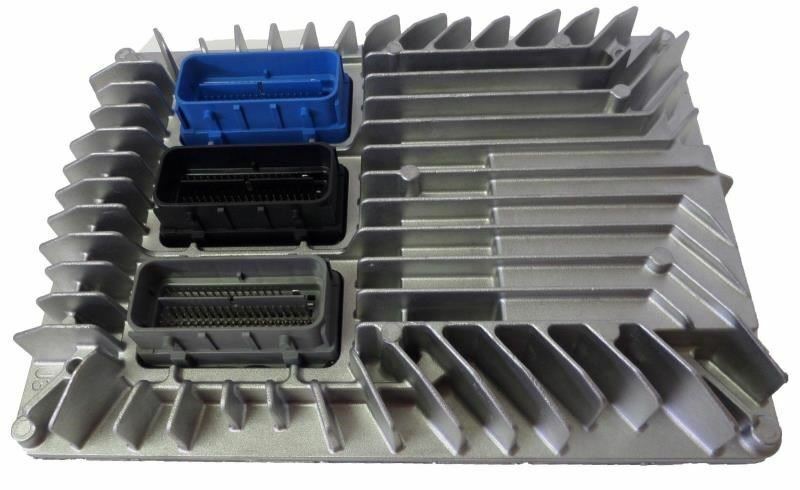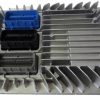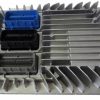Is Your GM Vehicle Running Rough? The ECM Might Be the Culprit.
The Engine Control Module (ECM), often called the engine computer, is the electronic brain of your vehicle. It manages everything from fuel injection and spark timing to transmission shifts and emissions control. When it begins to fail, it can cause a cascade of confusing and frustrating problems that can be difficult to diagnose. If your Chevrolet Impala, Cadillac CTS, Buick LaCrosse, or another compatible GM vehicle is experiencing erratic behavior, a failing ECM is a likely cause.
This replacement ECM, part number 12651994, is a direct-fit solution designed to restore your vehicle’s original performance and reliability. We take the guesswork and hassle out of the repair by programming the module specifically to your vehicle’s Vehicle Identification Number (VIN) before it ships. This means it arrives ready for installation, with the latest software updates from GM, saving you a costly trip to the dealership for programming.
From the Diagnostic Bay
We had a 2013 Chevy Malibu come into the shop with a persistent P0300 (Random Misfire) code. The owner had already spent a small fortune replacing spark plugs, ignition coils, and even the fuel injectors, but the check engine light always returned. After hooking up our diagnostic scanner and monitoring live data, we noticed the fuel trim and injector pulse width readings were all over the place, with no logical pattern. This pointed away from a mechanical issue and toward the central controller. We swapped in a VIN-programmed ECM, and the car immediately smoothed out. The live data stabilized, and the misfire code never returned. It’s a classic case where chasing individual symptoms can be costly, while addressing the root cause—the failing computer—provides the real fix.
Common Symptoms of a Failing GM ECM
- ✔ Check Engine Light: The most common sign. The light may be on constantly or intermittently, often with communication-related or processor fault codes.
- ✔ Engine Stalling or Misfiring: The engine may stall unexpectedly, run rough, or misfire as the ECM fails to properly manage the ignition and fuel systems.
- ✔ No-Start Condition: Your vehicle may crank but refuse to start because the ECM isn’t activating the fuel pump or ignition coils.
- ✔ Poor Fuel Economy: An incorrect air/fuel mixture controlled by a faulty ECM can lead to a sudden and significant drop in gas mileage.
- ✔ Erratic Transmission Shifting: The ECM works with the Transmission Control Module (TCM). A failing ECM can cause harsh shifts, delayed engagement, or getting stuck in one gear.
- ✔ Performance Issues: You might notice a general lack of power, poor acceleration, or hesitation, as the engine is not being managed efficiently.
Installing Your Programmed Impala Engine Control Module
One of the biggest advantages of this module is the VIN-specific programming we perform before shipping. This process ensures the computer has the correct software and calibration files for your vehicle’s exact configuration, including its engine, transmission, and factory options. For most applications, this makes the installation a straightforward, plug-and-play process. Once you provide us with your VIN during checkout, our technicians handle the complex programming. You receive a part that is ready to be installed without the need for specialized dealer tools.
This module is a direct replacement for several part numbers, including 12651994, 12643248, and 12652814. It fits a wide array of General Motors vehicles, such as:
- Chevrolet: Impala, Orlando, Camaro, Captiva Sport, Malibu, Equinox, Traverse
- Cadillac: CTS, SRX
- Buick: LaCrosse, Verano, Regal, Enclave
- GMC: Acadia, Terrain
- Holden: Caprice
Please verify the part number from your original module and consult the detailed fitment list to ensure compatibility with your specific year, make, and model.
Frequently Asked Questions
Why do I need to provide my VIN?
Your vehicle’s 17-digit Vehicle Identification Number (VIN) contains crucial information about its engine, transmission, and factory-installed options. We use the VIN to load the exact GM-specified software and calibration files onto the ECM. This ensures the module functions correctly and communicates properly with all other systems in your car, making the installation plug-and-play.
Is any additional programming required after installation?
In most cases, no. Because we program the module to your VIN, it should be ready to go upon installation. However, some vehicles may require a simple security relearn procedure (often called a CASE relearn or anti-theft relearn), which can typically be done without special tools. Instructions for this are widely available online or in service manuals.
How do I confirm this is the correct part for my vehicle?
The best way is to match the part number from your original ECM to one of the compatible numbers listed (12651994, 12643248, 12652814). You can also use the detailed fitment list on this page to check your make, model, and year. If you’re still unsure, please contact us with your VIN, and we’ll be happy to verify compatibility.
Will this ECM fix my check engine light?
If the check engine light is caused by an internal failure of the original ECM, then yes, this replacement part will resolve the issue. However, it’s essential to properly diagnose the problem first. The check engine light can be triggered by many other components, such as faulty sensors or wiring. We recommend having the codes read by a professional to confirm the ECM is the source of the problem.
Where is the ECM located on my 2014 Impala?
On the 2012-2016 Chevrolet Impala (including the ‘Limited’ models), the ECM is typically located on the driver’s side of the engine compartment, mounted to the air cleaner bracket. Location can vary slightly on other compatible models, so it’s always best to consult a service manual for your specific vehicle.


